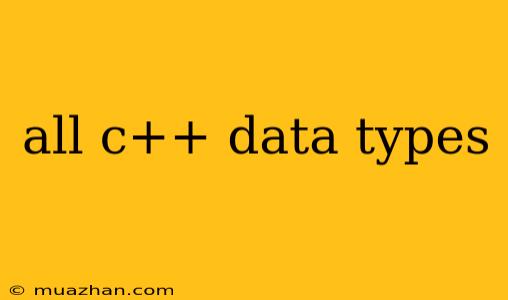All C++ Data Types
C++ provides a rich set of data types that allow you to represent different kinds of data in your programs. These data types can be broadly categorized into two groups: built-in data types and user-defined data types.
Built-in Data Types
Built-in data types are predefined by the C++ language and offer basic ways to represent values. These types are further categorized into:
1. Fundamental Data Types
- Integer Types:
char: Stores single characters, typically 1 byte in size.short int: Stores short integers, typically 2 bytes in size.int: Stores integers, typically 4 bytes in size.long int: Stores larger integers, typically 4 or 8 bytes in size.long long int: Stores very large integers, typically 8 bytes in size.
- Floating-Point Types:
float: Stores single-precision floating-point numbers, typically 4 bytes in size.double: Stores double-precision floating-point numbers, typically 8 bytes in size.long double: Stores extended-precision floating-point numbers, typically 8 or 16 bytes in size.
- Boolean Type:
bool: Stores boolean values, eithertrueorfalse, typically 1 byte in size.
- Void Type:
void: Represents the absence of a value. Used in functions that don't return a value or in pointers that can point to any type.
2. Derived Data Types
Derived data types are built upon the fundamental data types and provide more complex representations. These include:
- Arrays: A collection of elements of the same data type stored contiguously in memory.
- Pointers: Stores the memory address of another variable, enabling direct access and manipulation of data.
- References: A reference is an alias to an existing variable, providing another name to access the same data.
- Enumerations (enum): A set of named integer constants, making code more readable and maintainable.
- Structures (struct): A user-defined data type that groups variables of different data types under a single name, allowing for better organization.
- Unions: A special data structure that allows you to store different data types at the same memory location, but only one at a time.
User-Defined Data Types
User-defined data types allow you to create your own custom data types based on existing ones. These include:
- Classes: A powerful mechanism in C++ that encapsulates data and functions into a single unit, promoting data abstraction and code organization.
- Objects: Instances of a class, representing real-world entities with their own data and behaviors.
- Namespaces: A way to organize code into logical groups, preventing naming conflicts and promoting code reusability.
Choosing the Right Data Type
When choosing a data type for your variables, consider the following:
- The type of data you need to store: Integers, floating-point numbers, characters, booleans, etc.
- The range of values you need to represent: The data type should be large enough to hold the maximum and minimum values expected.
- Memory efficiency: Use the smallest data type that meets your requirements to optimize memory usage.
Understanding the different data types available in C++ is essential for writing efficient and well-structured code. Each data type offers unique capabilities that allow you to represent and manipulate data in various ways.
